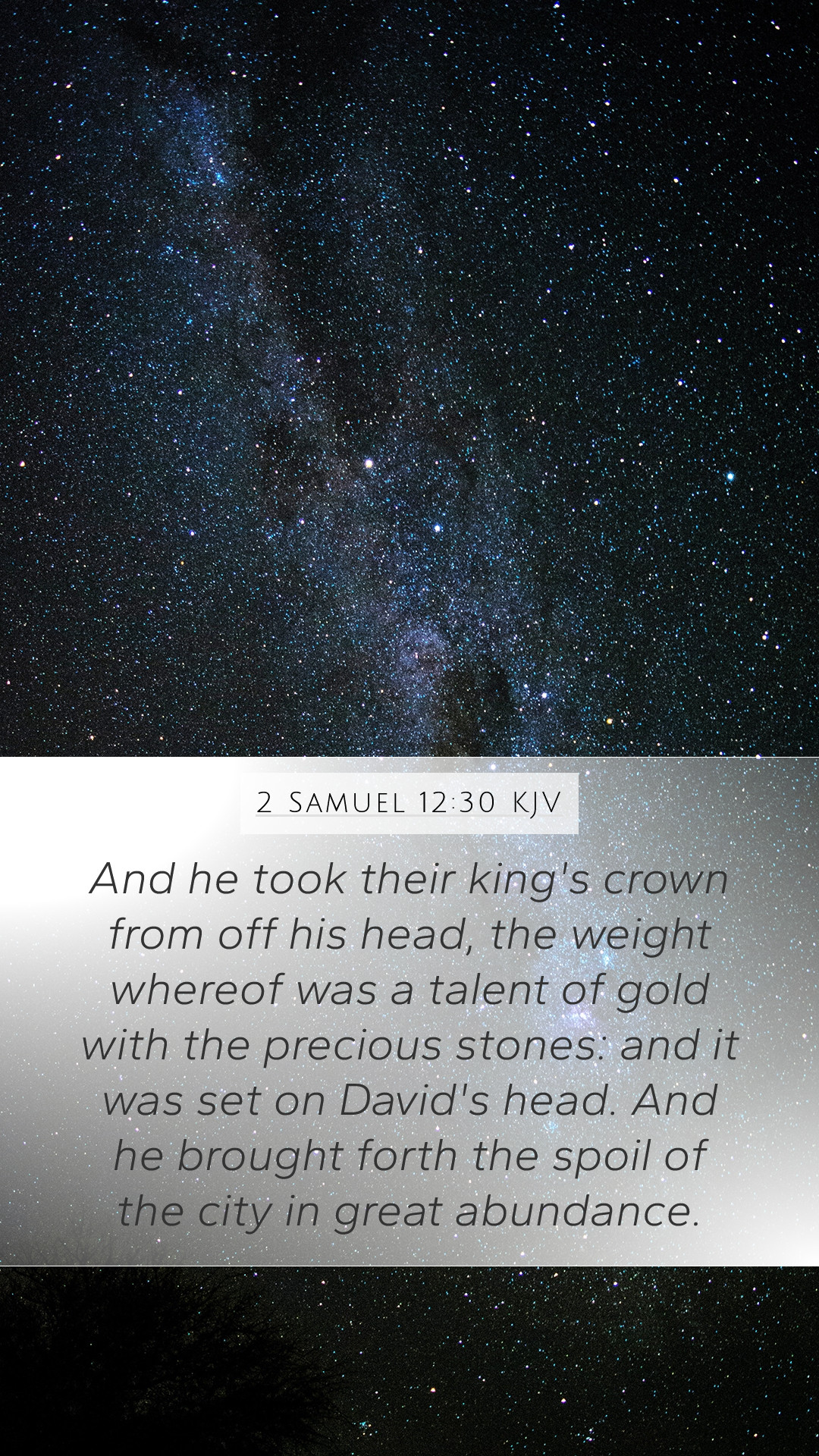Bible Verse Meaning: 2 Samuel 12:30
In this passage, David takes the crown of the Ammonite king, adorned with precious stones, and places it on his head after a significant victory. This moment is not just a record of military success, but it carries profound spiritual and moral implications. The following section provides a comprehensive understanding and commentary on this verse through insights drawn from notable public domain commentaries.
Overview of 2 Samuel 12:30
2 Samuel 12:30 reads: "And he took their king’s crown from off his head, and the weight of it was a talent of gold with the precious stones: and it was set on David’s head. And he brought also exceeding much spoil out of the city."
Commentary Insights
-
Matthew Henry's Commentary:
Matthew Henry emphasizes the glory of the victory, illustrating that God gave David triumph over his enemies. The taking of the crown signifies David's rightful place as God’s chosen leader. The weight of the crown, being a talent of gold, illustrates not only the wealth and grandeur of the Ammonite king but also the added responsibility that comes with it. Henry points out that every blessing in victory carries the weight of accountability to God.
-
Albert Barnes' Notes:
Barnes provides an examination of the material possessions taken in war, highlighting the concept that such spoils reflect God's provision for His people. The crown, indicative of human authority, now belongs to David, reinforcing that all earthly power is ultimately subject to God. The commentary suggests that God's favor is what leads to success, elevating David's authority and responsibility.
-
Adam Clarke's Commentary:
Clarke offers a historical context, explaining the significance of the crown from the perspective of ancient Near Eastern customs of kingship. He reflects that taking the crown symbolizes displacing the authority of the previous king, which leads to a deeper understanding of God's sovereignty. Clarke also notes that the precious stones represent the beauty and wealth God bestows upon His chosen rulers.
Interpretations and Understanding of 2 Samuel 12:30
This verse serves multiple layers of interpretation:
- Theological Significance: The act of taking the crown implies God's sovereignty; He raises leaders and brings down rulers according to His divine will.
- Moral Reflection: David's actions call believers to reflect on how they attain power and prestige; the spiritual weight must be considered along with earthly gain.
- Personal Application: In today's context, believers can examine their pursuits of success and authority, ensuring they align with God's purposes.
Cross References
- 1 Samuel 22:1-2 - David's rise to leadership
- 2 Samuel 5:3 - David being anointed king
- 1 Chronicles 20:2 - Similar account of victory over the Ammonites
- Psalm 21:3-4 - God's provision of blessings for His anointed
- Isaiah 28:5 - The significance of crowns in God's plan
Conclusion
In conclusion, 2 Samuel 12:30 is a rich verse that encapsulates themes of divine authority, the weight of responsibility, and the blessings that come with leadership. This overview aims to provide bible verse explanations and bible verse interpretations that not only highlight the historical and theological contexts but also invite personal reflection and application among believers seeking bible study insights.
Additional Resources for Bible Study
For those interested in deeper study, consider exploring:
- Commentaries that offer historical context
- Bible study guides focusing on the life of David
- Online Bible study platforms for group discussions


